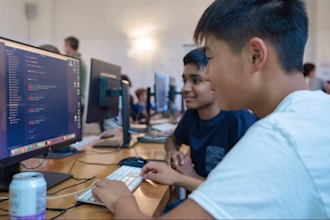Best Live Online Java Classes
Java is an object-oriented programming language, which is the most widely-used programming language in the world. Java is versatile enough that it can be used to create both simple programs and enterprise-level solutions. This versatility is one of the reasons that it’s so popular.
Have you ever streamed a song on Spotify? Have you ever purchased something on eBay? Have you ever ordered a ride from Uber? Or, maybe searched for something on Wikipedia? Then, you’ve used applications that were built on Java. It’s the language behind most mobile apps, baking and financial apps, blogs and news websites, and video and music streaming sites.
Despite its power and popularity, Java is a relatively easy-to-learn programming language. Its robust collections of libraries allow even novice coders to build powerful programs. Its also famous for its application programming interface, or APIs. APIs allow two computers to communicate and integrate with one another.
Learning how to code in Java is an important part of several hot career paths, including Full Stack Engineer, Software Engineer, Java Developer, Computer Scientist, and Mobile Developer. These Java careers offer high job satisfaction and lucrative salaries, typically around or more than six figures a year. Since the average annual income across all occupations is around $50,000, training in Java could double your annual income.
Best Live Online Java Classes & Schools
CourseHorse is a website that lists classes, workshops, events, and team-building activities. You can use CourseHorse’s site to find Java (or any!) classes in both major cities or online. While in-person classes are the most traditional way of training for a new career, online classes have exploded in popularity, especially since the COVID-19 pandemic. Online classes provide access to world-class instruction no matter where you live.
There are two primary types of online classes: asynchronous and live online. Asynchronous classes are typically delivered through pre-recorded lectures and can be taken entirely on-demand. Live online classes are taught by a live instructor, typically over a teleconferencing platform, such as Zoom.
Deciding which type of online class is right for you will depend on your particular circumstances and career goals. Choosing an asynchronous course is convenient for people with packed schedules or a lot of distractions at home since you can watch, pause, or rewind the lecture whenever you need. Although you will be responsible for your training and might not learn the skills you need or learn outdated material.
Live online classes work exactly like in-person classes. Because the class is happening live, you’ll be interacting with your instructor and your classmates in real-time. You can ask questions. You can collaborate on projects or get hands-on feedback on your work using screen-sharing software. They’re also recommended for people with busy schedules since they save you time on commuting.
Noble Desktop is a top NYC coding, business, and design school with more than three decades of experience training people for new careers. You can take all of their classes, bootcamps, and certificate programs live online or at their state-of-the-art campus in Midtown Manhattan. Their highly-rated projects-based approach guarantees that you learn the skills you need for a new career: an expert instructor teaches a short “micro-lecture” and then immediately guides students through applying what they learned using hands-on, real-world projects.
Noble Desktop offers both bootcamps and certificate programs in Java. Their bootcamps are designed to provide comprehensive training in skills, such as programming with JavaScript or React Development. Their Certificate Programs are designed to be career-comprehensive: graduates earn a New York State-Licensed Certificate in their new career path and receive 1-on-1 job mentorship. For example, graduates of Noble Desktop’s Web Design Certificate are prepared to launch a new career in web design and are guided through developing a professional portfolio to help them get hired.
Java isn’t just popular with businesses, it’s also popular with computer science departments at colleges and universities. Ambitious high school students who want to get a headstart on majoring in Computer Science or the AP Computer Science exam should consider the Java Programming Summer Program (High School) offered by NextGen Bootcamp. Teens ages 13-18 receive hands-on training in a beginner-friendly summer program surrounded by their peers . Some of the topics covered include object-oriented programming, recursions, and the foundations of programming in Java. No previous experience with coding is required.
ONLC offers a Java Programming Level 1: Intro for Non-Programmers. This course is beginner-friendly, typically has a small class size (less than ten), and is offered at many ONLC Training Center locations. You can check to see if it's offered at the ONLC location closest to you. Some of the topics covered in this course include creating your first Java program, compiling and interpreting applications, JSDK directory structure, installing and running Eclipse, setting up a project, creating new Java applications, setting up a project, Java language fundamentals (If statements, syntax, variables, expressions in Java, strings, arrays, loops), using Java objects, inheritance in Java, packages, and exception handling.
If you’re interested in taking an on-demand online course in Java, you might consider some of the courses offered by Coursera. Object-Oriented Programming in Java Specialization is a 6-month on-demand course that allows students to learn Java programming at their own pace. Students are expected to study for around 10 hours a week over four course modules with a flexible schedule. Some of the skills taught in this course include debugging, algorithms, software design, problem solving, data analysis, Java programming, object-oriented programming, data structures, software engineering, hash tables, and computer programming. Graduates earn a certificate of completion, which is sharable on Linkedin.
Another on-demand option is Become a Java Programmer from Udacity. Students are expected to already be familiar with basic computer programming, design pattern fundamentals, lightwright processes, functional programming, and basic Java. Students access the pre-recorded lectures and learn at their own pace. Some of the skills taught in this course include object-oriented programming, generics and collections, advanced collections, common types, working with classes, working with files, design patterns, reflection, concurrent programming, and function programming with Java. After completing the course modules, Udacity provides career training resources to help you get hired.
Industries That Use Java
Some of the most famous software applications in the world were created with Java, including Microsoft Word, Minecraft, Twitter, Signal, CashApp, Uber, Spotify, and eBay. Java is the language behind Wikipedia’s search engine. It’s also been the programming language used for soe of the world’s biggest projects, such as the control system for NASA’s Mars Rover and mapping the human genome for the Human Genome Project.
This means that Java can be used in any industry. When you train in programming with JavaScript, you can further your career in your current industry, or find a position in any industry.
Java Jobs & Salaries
The popularity of Java makes is a high-demand skill. Careers that use Java typically earn around or more than $100,000 a year. Since the national average annual income across all occupations is around $52,000, training in Java could easily double your annual income.
Here are some of the average annual salary ranges for positions that use Java skills:
- Software Engineer: $116,000 - $139,000
- Java Developer: $104,000 - $96,000
- Computer Scientist: $109,000 - $153,000
- Mobile Developer: $124,000 - $86,000

























